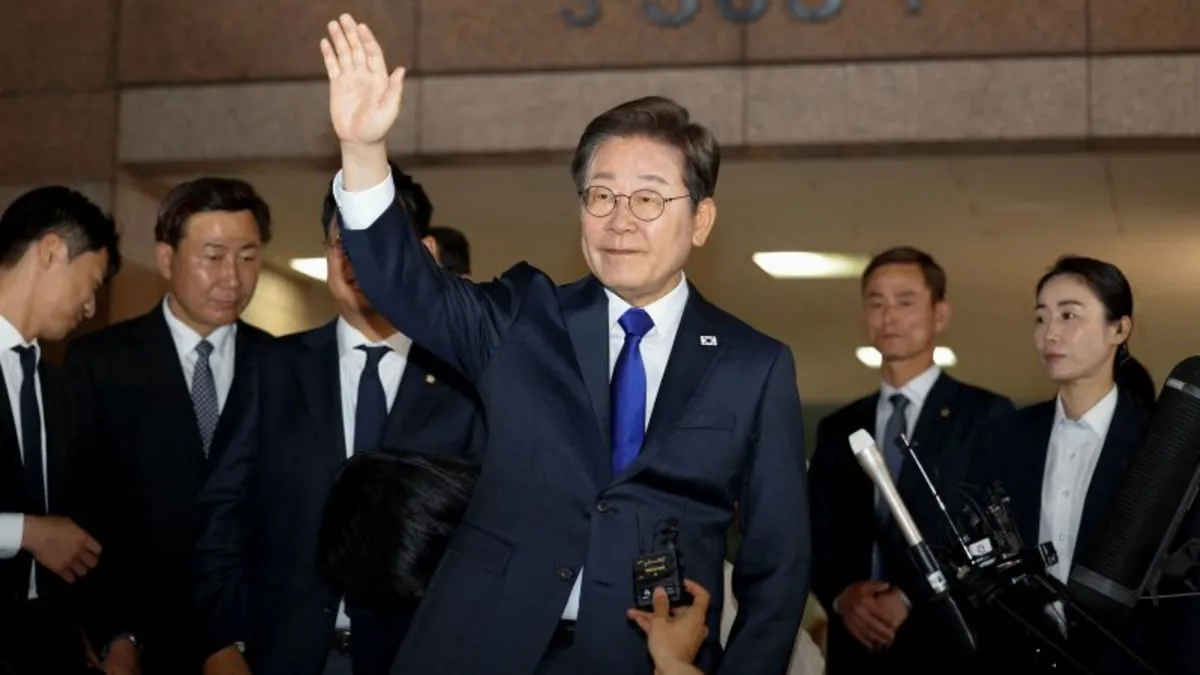
In a pivotal snap election held on Tuesday, Lee Jae-myung appears to be on track to become South Korea’s next president. An exit poll indicated that Lee, the candidate from the liberal Democratic Party, is leading significantly, prompting his main rival, Kim Moon-soo of the ruling conservative People Power Party, to concede defeat early Wednesday. In his concession speech, Kim acknowledged Lee's victory, stating he “humbly accepts the people’s decision.”
Lee’s anticipated victory comes just six months after the country was thrown into turmoil when the previous president declared martial law, triggering a chaotic political landscape. According to a joint exit poll conducted by KBS, MBC, and SBS, Lee is projected to secure 51.7% of the vote, while Kim is expected to garner 39.3%. As of now, the national election commission reports that 94.08% of the votes have been counted, with official results pending. Historically, exit polls have closely aligned with final election results, bolstering confidence in this projection.
During a rally in Seoul, Lee remarked on his favorable position, stating he is “the person with a very high chance to be your next president,” although he refrained from officially declaring himself the winner. His speech reflected a tone of optimism and determination, as he pledged to “work to restore the economy” from day one and ensure that there will never be a military coup in South Korea.
This election was closely monitored both nationally and internationally, as it holds the potential to restore some political stability to a nation grappling with the aftermath of a martial law crisis. Following months of uncertainty, South Korea's export-oriented economy faces challenges due to global issues such as rising tariffs from the US and the looming threat of a recession. Cho Hee-kyoung, a law professor at Hongik University, emphasized the election's importance, noting that the absence of a stable leader during the tariff disputes with the US posed significant problems for the country's economy.
The voter turnout for this election reached 79.3%, the highest since 1997, which indicates a robust engagement from the populace. Political experts believe that this election represents a return to a more stable political climate, particularly as Lee's Democratic Party already holds power in the unicameral legislature. Celeste Arrington from the George Washington University stated that with a Democratic president in place, pushing through policies may become more feasible compared to the previous administration.
Lee Jae-myung, a former underage factory worker turned human rights lawyer, has had a tumultuous political career. He previously served as the mayor of Seongnam and as the governor of Gyeonggi Province. His political ascent faced challenges, including a narrow defeat to former President Yoon Suk Yeol in the 2022 presidential election and a near-fatal assassination attempt in January 2024. The attack, which left him with a neck injury, did not deter his political ambitions, and he played a vital role during the martial law declaration by rushing to the legislature to vote against the decree.
On the campaign trail, Lee often appeared in a bulletproof vest and behind bulletproof glass, reflecting the serious nature of his political climate. He has promised significant reforms, including limiting a president’s ability to declare martial law and revising the constitution to allow for two four-year presidential terms instead of the current single five-year term. Lee’s platform also includes boosting small businesses, expanding the AI industry, and addressing geopolitical tensions with North Korea while emphasizing human rights.
Despite his anticipated victory, Lee's path to the presidency is not without challenges. He faces ongoing legal issues, including trials related to allegations of bribery and a property development scandal. Furthermore, he was previously convicted for violating election law, although he continues to deny all charges and claims that these accusations are politically motivated.
Looking ahead, Lee’s administration aims to rebuild relationships with the US, which were strained during the martial law crisis. His foreign policy advisers have indicated that the alliance with Washington will remain a cornerstone of South Korea's diplomatic efforts. Negotiations concerning US tariffs on South Korean exports are also a priority, as these tariffs significantly impact key sectors of the South Korean economy.
As Lee prepares to take office, his ability to maintain a balance in international relations, particularly with the US and China, will be crucial for the stability and growth of South Korea's economy. The coming months will reveal whether Lee can effectively navigate the complex political and economic landscape while addressing the pressing needs of the South Korean populace.